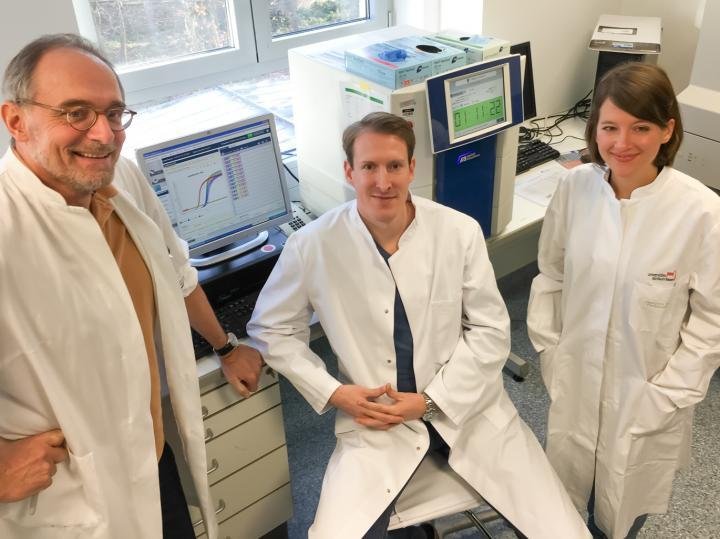Professor Hubert Schorle (left), Dr. Daniel Nettersheim and Ph.D. student Sina Jostes investigate changes in gene expression following JQ1 treatment in testicular cancer cells. Simon Schneider/Institute for Pathology UKB
BONN, Germany, Dec. 28 (UPI) -- Scientists have discovered a drug, originally developed as a male contraceptive, has the potential to treat testicular cancer.
Researchers from the University of Bonn have found that the drug JQ1, an innovative contraceptive that blocks sperm maturation, may shrink testicular cancer tumors.
Testicular cancer is the most common form of cancer in men between the ages of 20 and 40. It has a high treatment success rate but certain cases do not respond well to treatment.
JQ1 is part of a class of drugs that influence which genes in a cell are active and which are not.
Researchers explained that DNA is similar to a long strip of Morse code, where the assembly instructions for cellular molecules are found. In order to fit into the cell nuclei, the DNA is wrapped around small protein balls known as histones. Histones feature chemical tags called methyl or acetyl groups that signal to the cell whether the DNA should be read or not.
"JQ1 inhibits those proteins that read these histone marks and thus changes the gene activity in the cell," Professor Hubert Schorle of the Institute for Pathology at the University of Bonn, said in a press release.
The cancer cells react to these changes activating a suicide program called apoptosis.
"In a testicular cancer mouse model, the tumors began to shrink after administering JQ1," Sina Jostes, lead author of the study, said in a press release.
JQ1 was not the only drug to alter histones. Romidepsin, a drug already approved for treatment of patients with certain types of cancer, also altered the marks of the histones in the study.
"In our study, we treated mice with both JQ1 and romidepsin," Dr. Daniel Nettersheim, participant in the study, said in a press release. "This way, we achieved a similar effect alike JQ1 or romidepsin treatment alone, but we could reduce the quantities of both substances. Such a combination therapy to treat testicular tumors may be much better tolerated. Chemotherapy-resistant patients could also benefit from this."
The study was published in the Journal of Cellular and Molecular Medicine.















